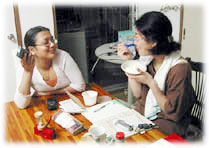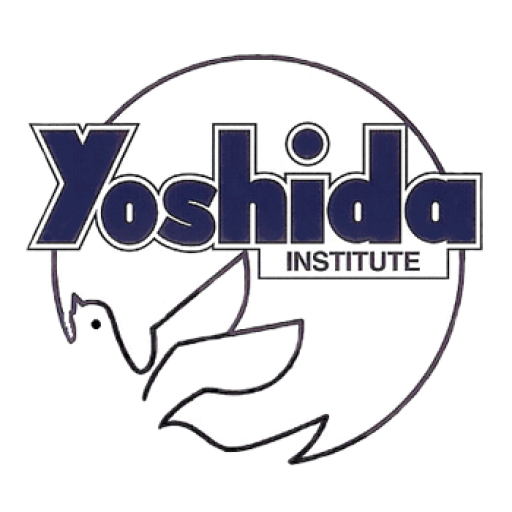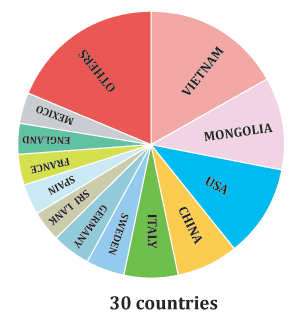HOUSING OPTIONS
Housing
 While Tokyo has a reputation as being an expensive place to live, there are actually quite a large number of possibilities open for foreigners coming to study in Japan. A large percentage of Japanese university students study in the Tokyo area so there’s a wide Shrutee and Tomo variety of student housing available, from dormitories to private apartments. While Yoshida does not provide any sort of housing for students, we can definitely help you with your housing search.
While Tokyo has a reputation as being an expensive place to live, there are actually quite a large number of possibilities open for foreigners coming to study in Japan. A large percentage of Japanese university students study in the Tokyo area so there’s a wide Shrutee and Tomo variety of student housing available, from dormitories to private apartments. While Yoshida does not provide any sort of housing for students, we can definitely help you with your housing search.
When you arrive in Japan, there are a number of hotels and inns that are a short commute away from the school, especially near big train stations such as Ikebukuro, Shinjuku and Ueno. Several are listed on our housing options page.
For short stays in Japan, a guest house is often the easiest option. Students live together with other foreigners and Japanese. The monthly rent includes the use of a furnished room, internet connection(WiFi), a shared kitchen and often all utilities also. Some are quite large with up to fifty people living in one building but others are small with only five or six people living together. When you arrive you can investigate the possibilities and see what works best for you.
Procedure at municipal office
After finding housing, students who come to Japan on a student visa will need to register at the local civic center within 14 days after arrival in Japan. You will need to bring your residence card. Once you’ve received a residence card (zairyuu-card), which can be used as a means of identification in lieu of your passport. : Application form(PDF-30.2kb)
Moving-Out, Moving-In:
When you move out to another city or ward, you must submit a moving-out notice and receive a moving-out certificate before you proceed with moving in to your new address in another city or ward. A moving out certificate will be issued free of charge. After moving in, the certificate must be submitted to the new municipal office to complete the moving-in notification. Soon after you moved, please tell us your new address.
Guest Houses and Dormitories
Guest houses and dormitories provide affordable short-term or long-term accommodation for many students. Guest houses provide rooms in small houses, from three rooms and up, with shared kitchen and bath facilities. Rooms in dormitories are typically the cheapest but afford very little privacy.
- OAKHOUSE – guest house and apartment rental agency. Earn Oakhouse PAO points you can use when moving in! Register as an Oak Member now and get 10,000 PAO points (1 PAO=1 yen)!
- Soleil Waseda – It’s a five minutes’ walk from our school.Clean, Safe & Convenient(Ladies only)
- Sakura House – guest house and apartment rental agency.
- Borderless House – Let’s room share with Japanese! – Location: More than 60 places inside Tokyo area.
- Fujimi House – Monthly furnished Guest house(with private bed room) in centrally located in Tokyo.
There are also listings for guest houses and rooms in apartments shared with other foreigners in two free weekly magazines, Tokyo Notice Board.
Apartments
Students planning to live in Japan for a long time can rent an apartment on their own but the process is somewhat complicated. A typical strategy for finding an apartment is to first explore various places that are a convenient commute away from school and visit real estate agents in the area. Information on apartments is only provided in Japanese so it’s best for beginning students to wait a while before trying to rent an apartment on their own.
The following three companies will be able to handle phone calls in English(or Multilingual).
- Fontana – Short term rental real estate company with no key money or guarantor required! All apartments are fully furnished. Move-in today with only first month’s rent and 1 month refundable security deposit.
- Kimi Information Center – apartment listing service.
- Fujimi House – Monthly furnished private rooms in Tokyo.
A rental system in Japan
Students are expected to make their own arrangements. There is usually a kitchen, toilet and bath in every apartment. Many apartments in Japan are unfurnished, and students will need to provide themselves with daily necessities.
* The size of the private apartment is 9㎡ – 12㎡.
Cost
Rent is normally paid on a monthly basis. The following shows the average monthly rent in Tokyo City. Click red number : Convert yen into dollars.
- room rent : ¥55,000 – ¥100,000
- Common service fees : ¥3,000 – ¥5,000
- Common service fees are fees for facilities shared by tenants.
SHIKIKIN / REIKIN
When the contract to rent a room is signed, the tenant must pay a lump sum of money known as SHIKIKIN and REIKIN to the landlord.
SHIKIKIN (key-money and/or deposit): a sum of money to be paid to the landlord as security money for possible damages. SHIKIKIN will be refunded upon vacating the room after a check has been made for any delinquency of rent and/or damage to the property.
REIKIN (remuneration): a non-refundable fee to be paid to the landlord when the contract is signed.
The amount of the commission to the real estate company is equal to one month’s rent or half month’s rent.
* SHIKIKIN and REIKIN combined amounts to around 2 to 4 times the monthly rent.
Utilities, such as electricity, gas and water, are typically not included. Electricity is usually the most expensive of the three followed by gas and water. The average cost for utilities for one person is just under 10,000 yen a month: about 4,000 yen for electricity, 3,000 yen for gas and 2,000 yen for water.
Internet connection services.(WiFi)
- NTT East (English) : NTT East Official Site for Internet Connection Services
- au Hikari (English) : au Hikari Official Site for Home Internet Connection
- Softbank (English) : Softbank Hikari Official site for Home Internet Connection
Housing Guarantor System
Generally, when you sign an apartment rental contract in Japan, a co-signer is required. When a co-signer is not available, you must use the services of a guarantor company. The guarantee company is introduced by a real estate company.
- You do not have to find anyone to co-sign for your housing. You can enjoy the company’s co-sign guarantee simply by designating both an emergency contact person in your home country (family), and an emergency contact here in Japan (Yoshida staff).
- Guarantor fees:First time service fee: 25,000 yen to 45,000 yen.
Hotels and Inns
The Yoshida Institute is located in the western part of Tokyo, near Shinjuku and Ikebukuro. When you first arrive you’ll most likely need to spend a short amount of time in a hotel or inn until you get settled. There are a large number of hotels nearby and the ones below are some of the more affordable choices. Booking in advance is recommended but you can always reserve a room at the Welcome Inns Reservation Desk at Narita Airport when you arrive.
- Kimi Ryokan – a modern Japanese-style inn popular with foreigners
- Taito Ryokan – very inexpensive inn near Asakusa
- New Koyo Hotel – backpacker’s hotel with a mixture of Western-style and Japanese-style rooms.
- Tama Ryokan – small Japanese-style inn in Takadanobaba, a 20 minute walk to school.
- House Ikebukuro – modern Japanese-style inn in Ikebukuro
The Welcome Inns network also runs an online reservation service where you can look up hotels and make reservations.






